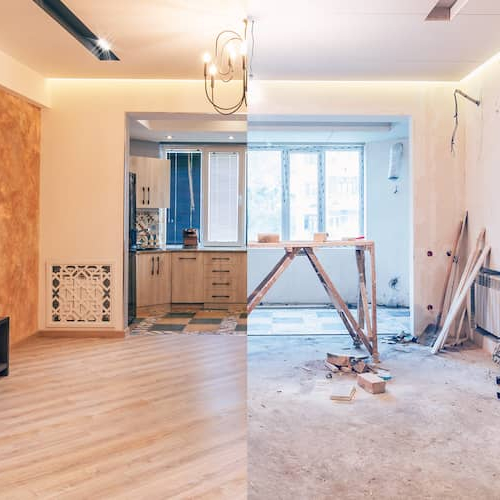What is an open-end mortgage and should you consider getting one?
Contributed by Tom McLean
Dec 9, 2025
•6-minute read

Buying a home is one of the most significant financial decisions you can make, especially if the home requires updates. An open-end mortgage allows you to buy a home and finance renovations with a single loan, helping you manage expenses such as the down payment, closing costs, and improvements.
While Rocket Mortgage® doesn’t offer open-end mortgages, understanding how they work can help you compare your borrowing options and find the best fit for your situation.
What is an open-end loan?
An open-end mortgage lets you borrow more than you need to buy your home, leaving money available for later use. When your mortgage closes, you draw what you need for the purchase or refinance. The rest of your approved amount, called future advances, can be used for eligible home projects.
You’ll pay interest only on what you borrow, not the total amount you were approved for. Rules regarding how and when you can draw on your future advances vary depending on your lender and your location.
Think of an open-end mortgage as something between a traditional mortgage and a home improvement loan. You can access more funds when you need them, but you don’t pay interest until you use them.
Open-end mortgages are uncommon and usually available only through select lenders or state programs.
How does an open-end mortgage work?
Open-end mortgages are often used by buyers purchasing fixer-uppers that need significant renovation before move-in. This type of financing works like a home purchase loan, plus renovations, allowing you to buy a property and fund improvements through a single mortgage.
Imagine you’re approved for an open-end mortgage of $400,000. You use $300,000 to buy a home, knowing you’ll need $50,000 for updates, such as replacing the roof or remodeling the kitchen.
With an open-end mortgage, you can use $300,000 to purchase the property and set aside $100,000 as future advances. If you were to draw $50,000 later for renovations, you would pay principal and interest only on the $350,000 you’ve used. Because interest accrues only on the borrowed funds, open-end loans can provide flexibility during a home improvement project.
Repayment of an open-end mortgage is similar to that of a home equity line of credit, or HELOC. The loan has a draw period, during which you can borrow from the future advances. When the draw period ends, you can no longer borrow future advances and begin making payments on the full amount borrowed. Rocket Mortgage does not currently offer HELOCs.
To estimate the monthly payments on a home loan, try the mortgage calculator from Rocket Mortgage.
Pros and cons of open-end loans
Like any financing option, open-end mortgages come with benefits and trade-offs.
Pros
- You can buy a home and finance renovations with a single loan. You can combine your purchase and renovation costs into one monthly payment, simplifying budgeting and loan management.
- You only go through one mortgage application process. You’ll need to qualify for and close one mortgage instead of applying for separate home purchase and home improvement loans.
- You pay interest only on what you use. Borrowers are charged interest only on the portion of funds they’ve drawn, which can reduce costs early on in the project.
Cons
- They're not widely available. Open-end mortgages aren’t offered in all states or through every lender. Regulations vary, and some states limit or restrict open-end lending. To find out if open-end mortgages are available in your state, check with your state’s housing finance agency or financial regulatory office.
- Limits on how much you can borrow. You can only borrow the amount you’re preapproved for, even if your renovation expenses increase.
- Draw period limits: You have a specific time frame to borrow additional funds for improvements.
Who qualifies for open-end mortgages?
The requirements for an open-end mortgage are similar to those for a traditional mortgage. However, while some open-end mortgages meet conforming conventional loan guidelines that allow Fannie Mae and Freddie Mac to buy them from lenders, some are not. Loans that don't meet those requirements are nonconforming loans, and the lender may set its own requirements for borrowers.
Here are some general guidelines you should plan to meet when applying for an open-end home loan:
- A debt-to-income ratio (DTI) of 43% or less
- A loan-to-value ratio (LTV) of 80% or less
Do open-end mortgages cost more over the loan term?
Open-end mortgages can cost more over time, depending on your lender’s terms and how much of your available balance you use. Because these loans don’t always meet Fannie Mae and Freddie Mac’s purchase standards, they’re often treated as nonconforming loans. This means they can’t be sold to government-sponsored enterprises unless certain conditions are met, such as limiting future advances.
Conforming loans that meet these standards typically offer lower interest rates and fees, while nonconforming loans – including many open-end mortgages – may come with slightly higher rates to offset lender risk.
It’s a good idea to compare options like home equity loans, cash-out refinances, or HELOCs to see which structure best matches your renovation plans and long-term goals.1,2
Alternatives to open-end mortgage loans
Conventional mortgages don’t provide extra funds for renovations the way open-end mortgages do. If you're unable to obtain an open-end loan or want a more traditional solution, other financing options let you bundle both home buying and renovation expenses into a single loan.
Fannie Mae HomeStyle loan
A Fannie Mae HomeStyle loan allows borrowers to combine the costs of purchasing a home and renovating it into one loan. Funds for the purchase are distributed at closing, while renovation funds require contractor plans and lender approval before they're released.
Unlike an open-end mortgage, the HomeStyle loan is a closed-end loan, meaning you can’t borrow additional funds later.
FHA 203(k) loan
An FHA 203(k) loan lets buyers combine a standard FHA loan with renovation financing into a single monthly payment. It’s designed to make it easier to buy and repair a home that needs updates.
This loan can cover a wide range of improvements, from energy-efficient upgrades to structural repairs, and it’s often popular among buyers who want to personalize an older home. Because the Federal Housing Administration backs the loan, qualification standards are generally more flexible than those for conventional renovation loans.
VA renovation loan
Eligible military personnel, reservists, and surviving spouses can use a VA renovation loan to buy and repair a home, often with no down payment required. The program allows borrowers to roll both the home's purchase price and renovation costs into a single VA-backed loan, simplifying financing for those who qualify.
It’s especially helpful for veterans who find a property in need of updates but want to take advantage of the favorable terms that come with a VA loan, such as limited closing costs and no private mortgage insurance.
USDA Section 5 Home Repair loan
The USDA Section 504 Home Repair program offers loans and grants to qualified homeowners in rural areas. It helps eligible borrowers repair, modernize, or upgrade their homes to improve safety and livability.
FAQ
Buying a home often raises questions, especially when you’re exploring less common loan options.
What’s the difference between a traditional mortgage and an open-end mortgage?
A traditional mortgage provides a lump-sum loan at closing that, when combined with your down payment, covers the full purchase price of the home. You begin repaying both the principal and interest immediately based on the total loan balance. An open-end mortgage lets you borrow up to a preapproved limit and use additional funds later for renovations, energy-efficient upgrades, or major repairs. Interest only accrues on the amount you borrow, not the unused portion.
Who offers open-end loans?
Few lenders offer open-end mortgages, and Rocket Mortgage doesn’t currently provide them. Because open-end mortgages are specialized products, they’re often available only through local or regional banks, credit unions, or state housing programs that allow future advances on home loans. Working with a mortgage broker can help you find lenders who specialize in these loans.
What is an open-end mortgage deed?
Because your total debt increases as you borrow future advances on an open-end mortgage, some states require an open-end mortgage deed. This document reflects that the loan balance may increase over time as borrowers draw additional funds. The open-end deed protects both you and the lender. It outlines how additional borrowing works, the maximum amount allowed, and the conditions for releasing new funds. Not all states recognize or require open-end deeds, so the specific rules and terminology vary depending on where you live.
The bottom line: An open-end mortgage lets you pay for renovations when buying a house
An open-end mortgage combines home purchase and renovation financing into a single loan. It can help buyers purchase a fixer-upper and make improvements without juggling multiple loans, although it may be more expensive or more challenging to find.
If you’re ready to explore alternative mortgage or renovation loan options, you can begin your application today with Rocket Mortgage.
1 Home Equity Loan product requires full documentation of income and assets, credit score and max loan-to-value (LTV), combined loan-to-value (CLTV), and home equity combined loan-to-value (HCLTV) ratios. Requirements were updated 11/19/25 and are tiered as follows: 680 minimum FICO with a max LTV/CLTV/HCLTV of 80%, 700 minimum FICO with a max LTV/CLTV/HCLTV of 85%, and 740 minimum FICO with a max LTV/CLTV/HCLTV of 90%. Your debt-to-income ratio (DTI) must be 50% or below. Valid for loan amounts between $45,000.00 and $500,000.00 (minimum loan amount for properties located in Michigan is $10,000.00). Product is a second standalone lien and may not be used for piggyback transactions. Product not available on Ameriprise products. Guidelines may vary for self-employed individuals. Some mortgages may be considered “higher priced” based on the APOR spread test. Higher priced loans are not allowed on properties located in New York. Additional restrictions apply. This is not a commitment to lend.
2 Refinancing may increase finance charges over the life of the loan.

Sam Hawrylack
Samantha is a full-time personal finance and real estate writer with 5 years of experience. She has a Bachelor of Science in Finance and an MBA from West Chester University of Pennsylvania. She writes for publications like Rocket Mortgage, Bigger Pockets, Quicken Loans, Angi, Well Kept Wallet, Crediful, Clever Girl Finance, AllCards, InvestingAnswers, and many more.
Related resources

5-minute read
Distressed property: Everything you need to know
A distressed property is a house that’s on the verge of foreclosure or has been reclaimed by a lender. Learn more about investing in distressed homes h...
Read more
9-minute read
Selling a house as is: What to know
Learn what it means to sell your house as is, the pros and cons, and how to attract serious buyers without making costly repairs.
Read more

7-minute read
What is a conventional loan?
A conventional loan is a non-government-backed home mortgage. Learn more about down payment requirements, getting approved, and more.
Read more